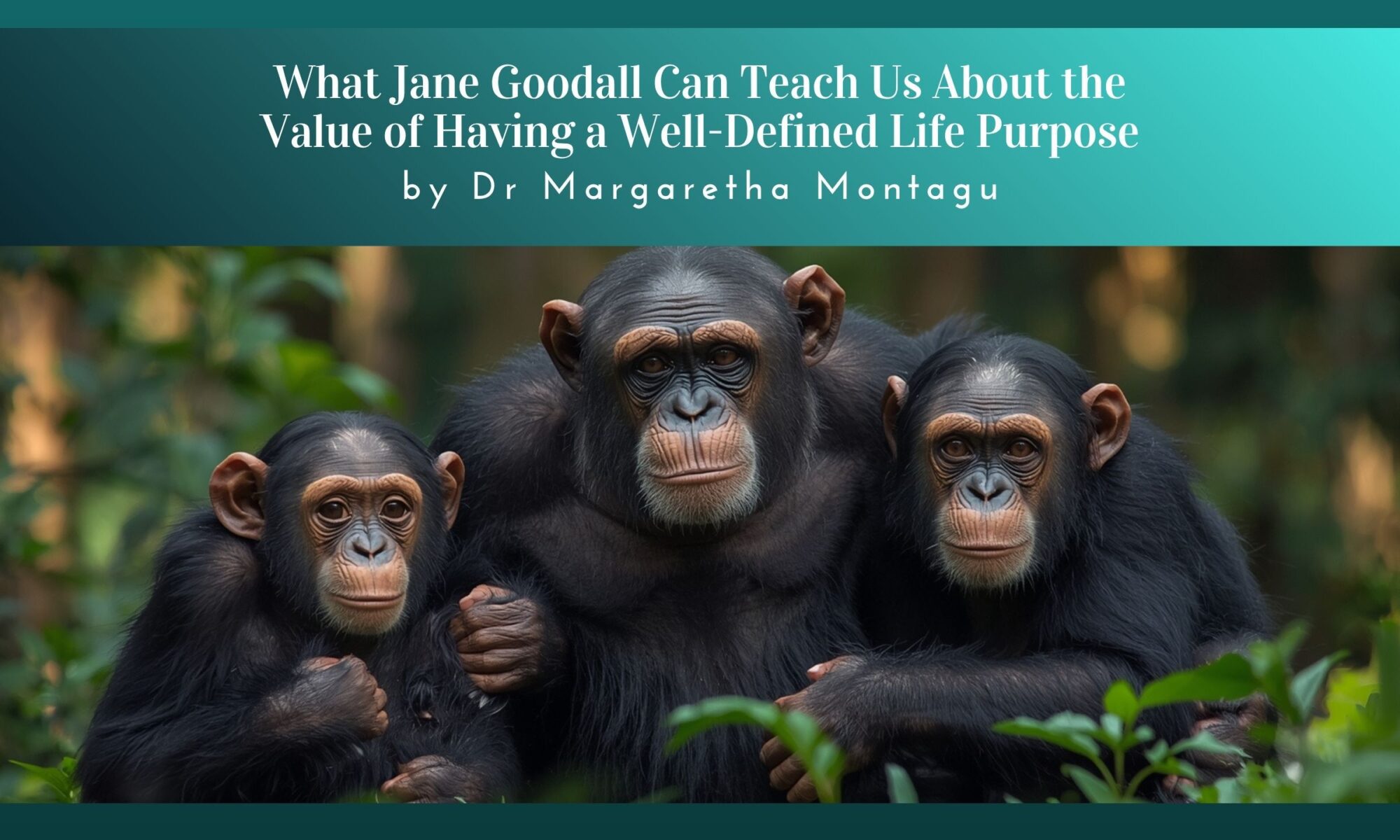Jane Goodall spent 65 years watching chimpanzees, and in doing so, taught humanity something profound: purpose isn’t something you find on a weekend workshop or discover during a mid-morning epiphany whilst reorganising your sock drawer. It’s something you commit to with such fierce, quiet determination that even death—as we’ve just witnessed—cannot diminish its impact. If you’re one of those successful, exhausted souls wondering whether there’s more to life than the next deadline, the next crisis, or the next perfectly curated LinkedIn post, you’re in the right place. This isn’t about finding yourself (you’re not lost). This is about what happens when purpose becomes your North Star rather than your nice-to-have.
Five Key Takeaways for the Purposefully Perplexed
- Purpose isn’t passion’s prettier cousin – It’s the thing you’d do even when you don’t feel like it, even when nobody’s watching, even when Netflix is calling your name.
- Your life’s work doesn’t require a jungle and a notebook – Jane had chimpanzees; you might have community, creativity, or connection. The subject matters less than the commitment.
- Purpose is the ultimate stress antidote – When you know your “why,” the “how exhausting” becomes considerably more bearable (says someone who’s spent 20 years helping stressed professionals rediscover theirs).
- It’s never too late, and you’re never too successful to start over – Purpose doesn’t care about your CV or your corner office. It cares about what makes you come alive.
- Purpose-driven living creates ripples – Jane affected conservation policy worldwide. Your purpose, however humble it seems, will touch more lives than you imagine.
Introduction
The world felt smaller on October 1st, 2025.
Dame Jane Goodall, that indomitable force who taught us that humanity’s greatest teachers might just be our closest genetic relatives, passed away in California at 91. She’d been on yet another speaking tour—because that’s what you do when you have purpose: you show up, even at 91, even when you could reasonably put your feet up and call it a life well-lived.
But here’s what struck me, watching the global outpouring of grief and gratitude: it wasn’t just that we’d lost a scientific trailblazer. We’d lost someone who showed us, through sheer bloody-minded persistence and gentle revolutionary spirit, what it looks like to live a purpose-filled life. No hedging. No backup plan. No “what if this doesn’t work out?”
And in her passing, she’s left us with an uncomfortable question: What are we doing with our one wild and precious life?
If you’re reading this, chances are you’re successful by conventional measures. You’ve climbed ladders, earned letters after your name, built something, led someone, made things happen. You’re good at what you do. Possibly brilliant at it.
But are you purpose-full? Or just schedule-full?
That’s the question Jane’s legacy poses to us. And it’s the question that’s been keeping you up at 3am, isn’t it? The one you push away with another project, another promotion, another perfectly reasonable excuse for why now isn’t the time to figure out why you’re actually here.
As someone who’s spent two decades as a medical doctor specialising in stress management, and another fifteen leading stress management retreats where people walk to clarity on the Camino de Santiago, I can tell you this: the crisis of purpose is an insidious one. It doesn’t announce itself with chest pains or panic attacks (though those might follow). It whispers. It niggles. It makes you feel vaguely fraudulent even as you succeed.
Carin’s Story: The Broken Compass
Carin Overton had always known where she was going. Not in some mystical, vision-board sense, but in the way high-achievers always know: next quarter’s targets, next year’s strategy, next decade’s careful accumulation of security and status.
Then her husband died.
Not dramatically. Just… gone. One Tuesday morning, he didn’t wake up. Sixty-three years old, apparently healthy, and suddenly, definitively absent.
The sympathy casseroles lasted three weeks. The bereavement leave lasted four. The assumption was that she’d “bounce back” because Carin always bounced back.
But Carin didn’t bounce back. She’d merely continued. There’s a difference.
Eight months after Martin’s death, she found herself sitting in her precisely organised home office—that spare bedroom they’d converted when she’d taken early retirement from her executive position—staring at a blank computer screen. She’d told friends she was “writing.” She’d told her sister she was “consulting.” She’d told herself she was “transitioning.”
What she was actually doing was haunting her own life.
The morning light through the window had that peculiar quality of early autumn, simultaneously warm and melancholy. She could smell the coffee she’d made an hour ago, now cold in its mug, a thin film forming on top like skin on old milk. Her fingertips rested on the keyboard, but no words came. Behind her, the radiator ticked and settled, the house creaking into its daytime posture.
She’d been so certain, once. Certain about her career trajectory. Certain about their retirement plans—the travel, the volunteering, the slower, sweeter version of life they’d mapped out together. Certain that all those years of strategic planning would pay dividends not just financially, but existentially.
Then Martin died, and the map disappeared.
Without him, without the work that had structured her days for thirty-seven years, without the next goal to chase, Carin felt like a compass that had lost true north. She spun, directionless, pretending to be busy whilst achieving absolutely nothing that mattered.
The turning point came on an unremarkable Wednesday.
She’d forced herself to the village café—the one with the uncomfortable chairs and excellent pastries—because sitting at home was becoming dangerous. Not physically dangerous. Worse: spiritually dangerous. The kind of slow erosion that happens when you stop engaging with life and start simply managing its surface requirements.
The café smelled of cardamom and fresh bread, and someone’s wet dog was creating a small puddle by the door. She ordered tea she didn’t want and found a corner table where she could appear purposeful with her notebook.
That’s when she overheard them.
Two women, probably in their seventies, laughing over something on a phone. One wore purple fingerless gloves despite the indoor warmth, and the other had the kind of silver hair that suggested not giving a damn about covering grey had been the best decision of her life.
“Look at this,” Purple Gloves said, turning the phone to show her companion a video. “Jane Goodall speaking to this group of schoolchildren last month. Ninety-one and still changing minds.”
The phrase hung in the air like steam from Carin’s untouched tea: still changing minds.
Not still working. Not still busy. Still mattering.
Carin found herself leaning forward, shameless in her eavesdropping.
“I heard she’s coming to Manchester,” Silver Hair said, stirring her coffee with slow, meditative strokes. “Want to try to get tickets?”
“Absolutely. Though I imagine everyone wants to hear her.”
“Of course they do. The woman’s spent sixty-five years studying chimpanzees and turned it into a global conservation movement. That’s not just a career, is it? That’s a calling.”
Calling. The word landed in Carin’s chest like something solid and unexpected. When was the last time she’d thought about having a calling rather than simply having responsibilities?
She left the café without finishing her tea, without eating the pastry she’d ordered, without even remembering to put on her coat. But she did remember something else: something that prickled at the edges of her awareness like a word on the tip of your tongue.
Back home, she stood in Martin’s study, she still called it that, couldn’t help it, and ran her fingers along the spines of his books. Philosophy. History. Poetry. Martin had been the thinker; she’d been the doer. That had been their balance.
But what did that make her now? A doer with nothing to do?
Her hand stopped on a slim volume: letters between two writers, discussing purpose and meaning. She pulled it out, dust motes spiralling in the slanted afternoon light, and a folded paper fell from between the pages.
Martin’s handwriting. A list, dated two years before his death: Things to do when we retire.
Her throat tightened as she read: volunteer at literacy centre, learn woodworking, create reading circle, mentor young entrepreneurs, teach…
The page blurred. When had they stopped talking about these things? When had retirement become about rest rather than renaissance?
That night, Carin did something she hadn’t done in months. She set an alarm. Not for morning—she’d been dutifully waking at 6:30 since Martin’s death, going through the motions of a routine without reason. No, she set an alarm for 8pm: a reminder to stop, to sit, to actually think about what came next.
Because here’s what Jane Goodall’s impending visit made clear: purpose wasn’t something that found you. You had to go looking for it, even when—especially when—you’d rather just keep your head down and survive.
The alarm went off as she was staring at the television without seeing it.
She turned it off, opened her notebook, and wrote the first honest sentence she’d managed in eight months:
I don’t know what I’m here for anymore. But I need to find out.
It wasn’t much. It wasn’t even beautiful. But it was true, and truth, she was learning, was where purpose begins.
The radiator ticked. Outside, a fox called to the October darkness. And in her chest, something that had been holding its breath for months finally, tentatively, exhaled.
The Goodall Principle: When Purpose Becomes Your Compass
Jane Goodall didn’t wake up one morning and decide to be Jane Goodall.
She was a young woman who loved animals, got an extraordinary opportunity, and then—here’s the crucial bit—kept showing up. For sixty-five years. Through criticism from the scientific establishment who said she was doing it wrong. Through personal heartbreak. Through funding crises. Through every possible reason to give up and do something easier.
That’s the Goodall Principle in action: purpose isn’t a feeling, it’s a commitment you make when the feeling has long since departed.
I’ve witnessed this crisis of purpose play out hundreds of times. It’s the hidden epidemic among high-achievers: the ones who’ve done everything “right” and still feel fundamentally adrift.
In my twenty years of clinical practice, I observed something consistent: the patients who recovered best from stress-related illness weren’t necessarily the ones who learned to relax (though that helped). They were the ones who reconnected with their purpose.
This insight deepened during fifteen years of hosting stress management retreats on the Camino de Santiago in southwest France. There’s something about walking that ancient pilgrim route, one foot in front of the other, stripped of your usual distractions and definitions, that reveals what truly matters to you. It’s a physical meditation that asks the question Jane Goodall answered so completely: What are you willing to dedicate your life to?
I’ve written eight non-fiction books exploring themes: divorce, loss, unexpected illness, and coping with crises—because these are the crucibles where purpose gets forged or forgotten. These aren’t abstract concepts for me. They’re the lived experiences of thousands of people I’ve walked alongside, both literally on the Camino and figuratively through therapeutic work.
And here’s what Jane Goodall’s life illustrates better than any case study: purpose transforms stress from something that destroys you into something that directs you.
Think about it. Jane’s work was objectively stressful. She lived in challenging conditions, faced professional opposition, dealt with funding pressures, and witnessed the destruction of habitats she’d fought to protect. But was she stressed in the way we typically mean it—that anxious, depleted, “I can’t keep doing this” sensation?
No. She was energised. Right up until the end.
That’s because stress + purpose = challenge. But stress without purpose? That’s just suffering.
The Ripple Effect
Jane Goodall’s impact extended far beyond her immediate research. She fundamentally changed how we understand non-human intelligence, revolutionised field research methodology, inspired conservation movements across continents, and influenced environmental policy at the highest levels.
But here’s what often gets overlooked: she also gave permission to thousands of people to pursue unconventional paths. To choose meaning over money. To persist when everyone said their approach was wrong. To believe that one person, armed with purpose and persistence, can shift paradigms.
That’s what purpose does. It creates ripples.
When you live from purpose rather than obligation, you give others permission to do the same. When you choose meaning over mere productivity, you challenge the cultural assumption that busyness equals importance. When you commit to something larger than yourself, you invite others into that larger conversation.
This is what I’ve witnessed in our monthly virtual storytelling circles—gatherings where people from diverse backgrounds come together to share stories prompted by a theme. Month after month, I watch strangers become witnesses to each other’s lives, and in that witnessing, find threads of purpose they’d lost sight of.
One participant, who joined feeling “invisible” after redundancy, discovered through storytelling that her gift was creating space for others to be heard. She now facilitates listening circles in her community. Another, grieving her mother, realised through crafting her story that she wanted to preserve family histories for others navigating loss.
These aren’t dramatic transformations. They’re quiet reorientations. But they matter. They ripple outward.
Jane Goodall started with chimpanzees and ended up reshaping human consciousness about our place in the natural world. Your purpose might start with something equally specific—mentoring one person, writing one true thing, fixing one problem in your community—and end up touching lives you’ll never meet.
That’s the beautiful, humbling truth about purpose: you don’t need to be famous for your life to be significant. You just need to know what you’re for, and then be relentlessly, gently for it.
For Those Standing at the Crossroads
If you’re reading this and thinking, “Yes, but how do I find my purpose?”—welcome. You’re exactly where you need to be.
Because here’s the truth that Jane Goodall’s life reveals: you don’t find purpose by thinking harder. You find it by paying attention to what you can’t not do. What calls to you even when it’s inconvenient. What matters to you even when nobody’s watching. What you’d defend even if it costs you.
For Jane, it was chimpanzees and the natural world. For you, it might be justice, creativity, healing, teaching, building, connecting, preserving, or any of a thousand things that make your particular soul catch fire.
The question isn’t “What should my purpose be?” The question is “What am I already paying attention to when I’m not trying to impress anyone?”
During my stress management work on the Camino, I don’t tell people what their purpose is. I simply create space for them to notice what they keep circling back to. The thing they mention in every conversation. The issue that makes them lean forward. The loss they can’t quite let go of because it’s pointing them toward something important.
Purpose doesn’t announce itself with trumpets. It whispers. And in our loud, busy lives, we’ve forgotten all about whispers.
Jane Goodall heard. And in hearing, in following, in persisting, she showed us what’s possible when you align your days with your deepest convictions.
The world needs more of that. Not more people trying to be Jane Goodall. More people willing to be as faithful to their purpose as she was to hers.
A Writing Prompt for the Purpose-Curious
Find a quiet space and thirty uninterrupted minutes. Pour yourself something comforting—tea, coffee, whisky, whatever speaks to your soul—and open your journal to a fresh page.
Write your responses to these questions without editing, without censoring, without trying to sound profound:
Part One: The Inventory
- What would I do if I knew I couldn’t fail?
- What issue in the world makes me irrationally angry or heartbroken?
- When do I lose track of time?
- What would I want said about me at my funeral? (Yes, morbid, but clarifying.)
- If I had Jane Goodall’s courage and one year left to live, how would I spend it?
Part Two: The Excavation
- Look back at your childhood. What did you love before the world told you what you “should” love?
- Think of the three people you most admire. What quality do they share?
- Complete this sentence ten different ways: “The world would be better if more people…”
- What do friends and family consistently ask for your help with?
- What would you do for free, even if nobody ever thanked you?
Part Three: The Commitment
- Based on what you’ve written, complete this sentence: “I am here to…”
- Don’t overthink it. Your first instinct is probably closest to truth.
- Now write: “The smallest step I could take toward this tomorrow is…”
Purpose doesn’t require grand gestures. It requires honest attention and small, consistent actions.
Jane Goodall started by watching chimpanzees. You might start by having one brave conversation, signing up for one course, volunteering for one hour, or creating one thing.
Start. That’s the whole secret.
Further Reading: Books That Illuminate Purpose
These aren’t your typical self-help books about “finding your passion.” These are deeper wells, for people ready to do the real work of aligning life with meaning.
1. “The Comfort Crisis” by Michael Easter
Why this book: Easter examines how modern comfort has disconnected us from the kind of meaningful struggle that builds purpose. His exploration of how humans thrive through challenge—not despite it—directly connects to Jane Goodall’s willingness to endure discomfort for her calling. This is particularly valuable for high-achievers who’ve optimised comfort out of their lives and wonder why they feel empty.
2. “Braiding Sweetgrass” by Robin Wall Kimmerer
Why this book: Kimmerer, a botanist and member of the Citizen Potawatomi Nation, writes about purpose through the lens of reciprocity with the natural world. Like Goodall, she bridges science and reverence. Her question—”What does the earth ask of us?”—reframes purpose not as self-actualisation but as responsibility to something larger. Beautifully written, quietly revolutionary.
3. “The Art of Gathering” by Priya Parker
Why this book: Purpose isn’t just personal; it’s communal. Parker’s examination of how and why we come together illuminates how individual purpose connects to collective meaning. For anyone wondering how their purpose might serve others, this book offers practical wisdom about creating meaningful connections, something Jane exemplified through her decades of inspiring others.
4. “Devotions” by Mary Oliver
Why this book: Poetry, yes, but Oliver’s entire body of work is essentially a meditation on paying attention—which is the foundation of purpose. Her famous question, “What is it you plan to do with your one wild and precious life?” could have been written for this moment. Read these poems slowly, and let them reveal what you already know but haven’t admitted.
5. “The Anthropocene Reviewed” by John Green
Why this book: Green reviews facets of human existence with tenderness and humour, finding meaning in both the monumental and mundane. His essays demonstrate that purpose doesn’t require saving species or changing the world. Sometimes it’s about showing up with full attention to what’s right in front of you. This is permission to make your purpose human-sized.
P.S. My life purpose courses, you’ll find practical exercises for people navigating transitions and seeking clarity about what comes next. It’s designed for busy people who need gentle guidance, not overwhelming transformation. Because purpose emerges in small moments of honest reflection, not grand gestures of self-reinvention.
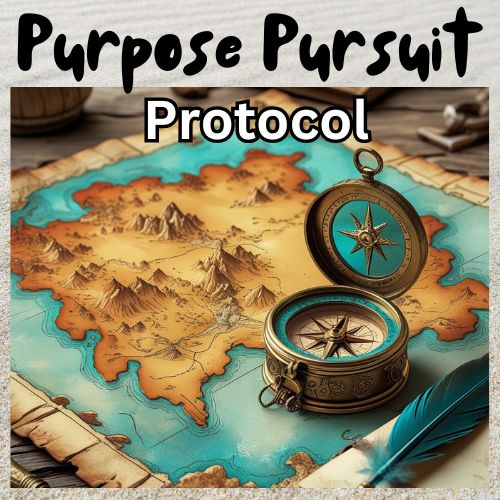
The Purpose Pursuit Protocol – if you want to discover your life purpose, this course will provide you with the clarity, motivation and direction you need to manifest your next chapter – in both your personal and professional life. Get immediate access
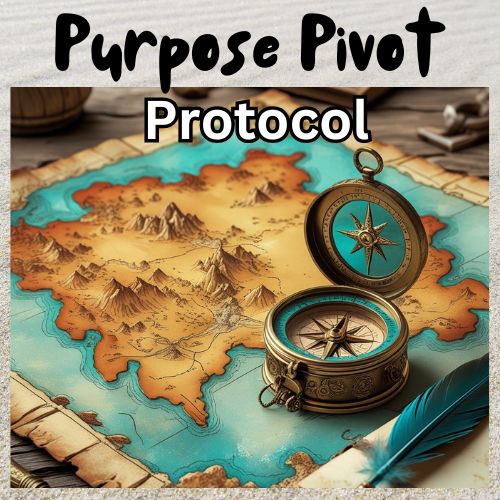
The Purpose Pivot Protocol – drawing inspiration from the Camino de Santiago, this transformative course guides you through a proven framework to recalibrate your authentic purpose and create a meaningful and fulfilling next act. Get immediate access
Voices from the Path: Testimonials
From a Camino Retreat Guest
“I came to Dr Montagu’s Camino retreat thinking I needed to find my purpose, as if it were hiding under a rock somewhere in the French countryside. I was exhausted, recently retired, and terrified that I’d wasted forty years climbing the wrong ladder. The walking itself was revelatory—there’s something about the rhythm of steps that quiets the anxious mind. But it was during one of the evening reflections that it clicked: I wasn’t looking for a new purpose. I was grieving the loss of my old identity. Dr Montagu’s gentle questioning and the safe space she created helped me see that purpose isn’t about what you do; it’s about how you show up. I returned home not with a five-year plan, but with permission to explore. I now volunteer with refugees learning English. It’s small. It’s local. It’s exactly right. The horses were lovely too—especially Twiss, who seemed to know I needed a judgement-free listener.”
— Sarah T., Former Corporate Director
From a Storytelling Circle Member
“I joined Dr Montagu’s monthly virtual storytelling circle on a whim, thinking it might be ‘nice.’ What I didn’t expect was to find my people—or myself. Each month, we gather around a prompt and share stories. There’s no performance pressure, no competition. Just witnessing and being witnessed. Through crafting and sharing my stories, I’ve discovered threads I’d lost sight of: my fascination with resilience, my love of collecting other people’s wisdom, my ability to find humour in dark places. I’ve started a podcast interviewing women over seventy about their most unexpected life chapters. It grew directly from what I learned about myself in the circle. Dr Montagu has this gift of creating space where truth can emerge. Also, she’s surprisingly funny, which makes the vulnerable moments easier to navigate.”
— Patricia M., Podcast Creator
Frequently Asked Questions
Q: I’m 55 and feel like it’s too late to find purpose. Did Jane Goodall start young, or is there hope for late bloomers?
Jane was 26 when she first went to Gombe, which feels young until you remember that most scientists of her era had PhDs by then—she didn’t even have a degree. She earned her doctorate later, at 32. But here’s what matters: purpose doesn’t have an age limit. I’ve worked with people who discovered their calling in their seventies. The question isn’t “How old am I?” but “How much life do I have left, and what will I do with it?” Besides, you’re not starting from scratch—you’re starting from experience. That’s an advantage Jane didn’t have.
Q: What if my purpose doesn’t feel “important” enough? Jane saved chimpanzees. I just want to help people tell their stories.
Stop that immediately. The hierarchy of purpose is a lie capitalism tells us to keep us competing. Jane’s work mattered because she committed to it completely, not because chimpanzees are objectively more important than stories. Stories shape how we understand ourselves and each other. They’re how humans make meaning. If that calls to you, honour it. The world needs good storytellers as much as it needs conservationists. Purpose isn’t about scale; it’s about alignment.
Q: I have responsibilities—mortgage, family, obligations. How do I pursue purpose without being irresponsible?
Jane had responsibilities too. She had a son, Hugo. She had funding pressures. She had a research station to maintain. Purpose doesn’t mean abandoning responsibility; it means finding ways to infuse your existing life with meaning. Start small. Dedicate one hour a week to what matters. Align your work toward what you care about. Use your skills in service of your values. Purpose is a compass, not a demand to burn your life down and start over.
Q: How do I know if what I think is my purpose is actually just ego or escapism?
Brilliant question. Here’s the test: Real purpose feels like both a burden and a gift. It’s something you’d do even when it’s hard, even when nobody applauds, even when you’re scared. Ego-driven goals feel exciting until they’re not, then you lose interest. Escapism feels like running away from something rather than toward something. Purpose feels like coming home. Also, ego goals are about you; purpose goals are about contribution. Jane wasn’t studying chimpanzees to be famous. Fame was a byproduct of her commitment.
Q: What if I try to live with purpose and fail?
Then you’ll have tried, which is infinitely better than wondering “what if” for the rest of your life. But let’s reframe “failure.” Jane Goodall “failed” constantly—grants rejected, papers criticised, habitats destroyed despite her efforts. She didn’t quit. Purpose isn’t about succeeding; it’s about persisting. The only real failure is never starting because you’re afraid of not being perfect. Besides, you’re asking this question, which means you’re already brave enough to try.
Conclusion: The Legacy Question
Jane Goodall left us on October 1st, but her legacy asks us to do something uncomfortable: examine our own.
Not our CV. Not our net worth. Not our LinkedIn endorsements or Instagram followers. Our actual legacy—the mark we’ll leave on the hearts and minds of the people whose lives intersect with ours.
She spent 65 years showing us what it looks like to live from purpose rather than drift through days. She demonstrated that one life, lived with clear intention and stubborn grace, can genuinely change the world.
But here’s what I want you to hear, really hear: you don’t need to change the world. You need to change your world, and trust that the ripples will reach further than you imagine.
As someone who’s spent 20 years in medical practice witnessing what stress does to purposeless lives, I can tell you this with certainty: the crisis of purpose is solvable. Not with a formula or a weekend workshop, but with honest attention and courageous small steps.
You have one wild and precious life. Jane Goodall showed us what it looks like to spend it well. Not perfectly. Not without struggle. But well—aligned with something that matters, committed to something larger than comfort, dedicated to something worth the decades it takes to make a difference.
The question is: “What will we accomplish with whatever time we have left?”
Not someday. Not when circumstances align. Not when you’re less busy or more certain or fully healed from whatever wounded you.
Now.
I can promise you this: the journey from “What’s the point?” to “This is my point” is navigable. It requires courage, honesty, and often, a guide who’s walked this territory before.
Jane Goodall has shown us the way. Now we have to walk it.
Take the Next Step: Walk Your Purpose into Being
Words on a screen are lovely. Insights are valuable. But purpose isn’t found in reading—it’s found in walking, both literally and metaphorically, toward what calls to you.
This is why I created the Camino de Santiago Crossroads Retreat in the sun-drenched, soul-stirring landscapes of southwest France. Not as a holiday (though the French countryside doesn’t hurt), but as a purposeful pilgrimage for people standing at life’s crossroads, wondering which path to take next.
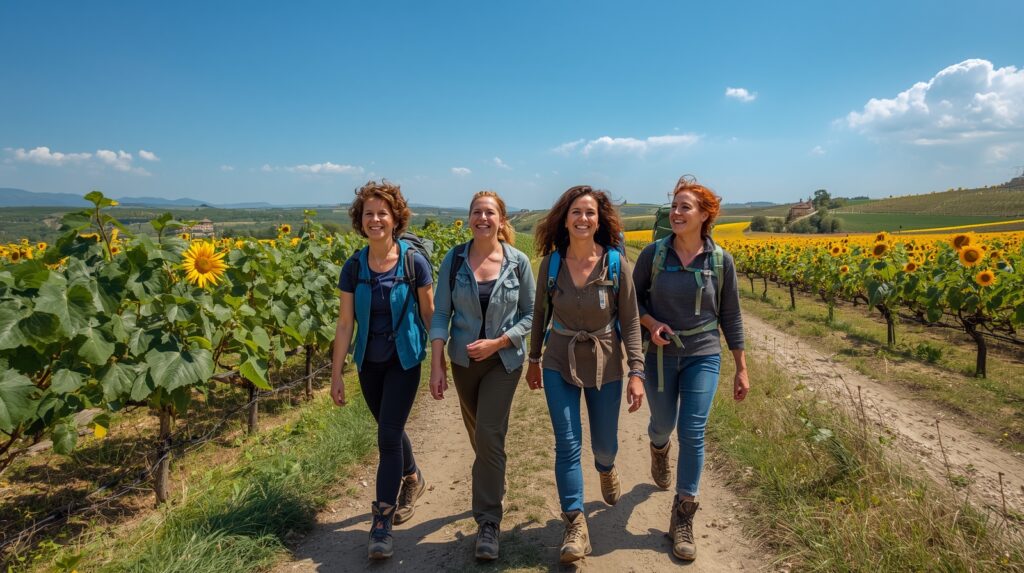


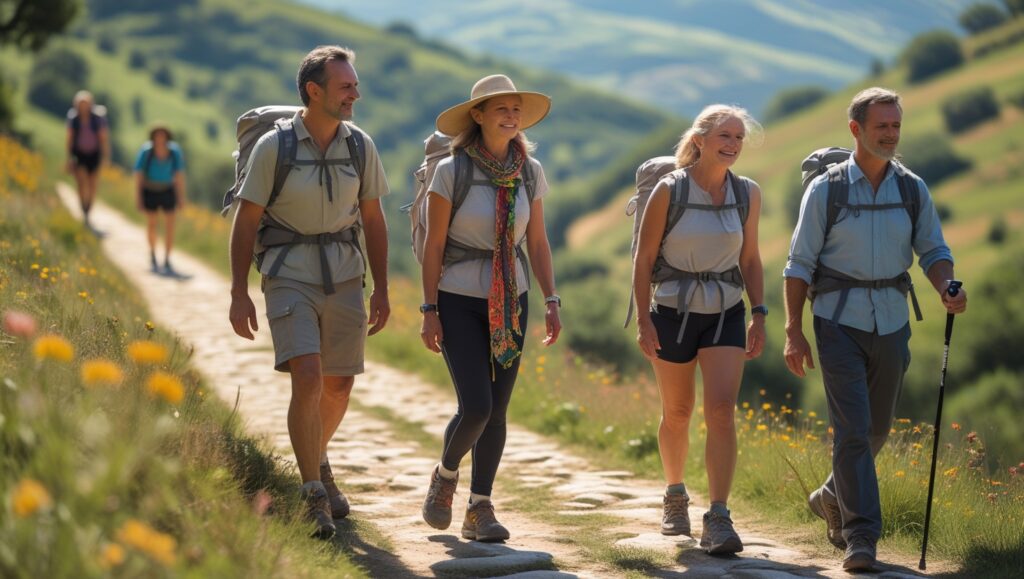





You’ll walk sections of the ancient Camino de Santiago—that legendary pilgrim route that’s been clarifying purpose for over a thousand years. But this isn’t just about physical movement. We integrate mindfulness and meditation practices specifically designed for stress management, helping you quiet the mental noise that’s been drowning out your inner wisdom.
Each evening, we gather for storytelling circles—those monthly virtual gatherings I mentioned earlier, but in person, amplified by the intimacy of shared experience and the stunning backdrop of French countryside. You’ll craft and share your stories, and in doing so, discover threads of purpose you’d lost sight of.
And then there are my beloved Friesian horses, Twiss, Kash and Zorie, and Falabellas, Loki and Lito. If you’ve never experienced the profound presence of horses, you’re in for something special. They offer judgement-free witnessing, gentle mirroring of your emotional state, and a grounding presence that helps you drop pretence and meet yourself honestly. There’s something about standing beside a horse that makes truth-telling easier.
This retreat is for you if:
- You’re successful but feel adrift
- You’re navigating a major transition (retirement, loss, career change, empty nest)
- You’re exhausted from achieving without meaning
- You’re ready to discover what you’re actually here for
- You want space to think, breathe, and rediscover yourself without the constant demands of daily life
Small groups (maximum four participants) ensure personalised attention. The combination of walking, storytelling, meditation, and equine connection creates multiple pathways to clarity. And the supportive community that forms during these six days often continues long after you return home.
Jane Goodall showed us what it looks like to live with purpose. The Camino de Santiago has been helping pilgrims discover theirs for centuries. And I’ll guide you through it with care, expertise, and occasional inappropriate humour.
Your purpose is waiting. Sometimes you need to walk toward it.
Learn more and make a reservation: Camino de Santiago Crossroads Retreat
Because life’s too short to spend it wondering “what if.”
And as Jane Goodall taught us right up until her final days: it’s never too late to show up for what matters.
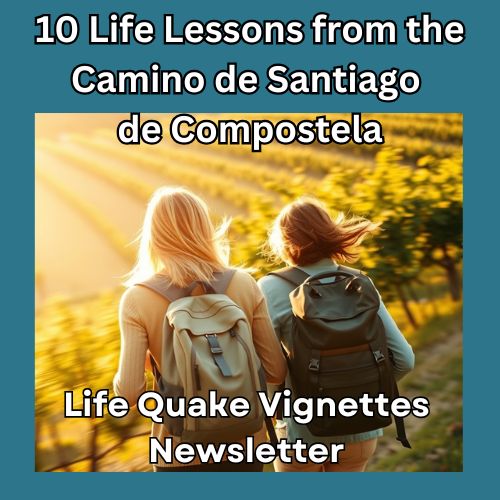
10 Powerful Life Lessons Learned While Walking the Camino de Santiago – a free guide filled with 10 not just “quaint anecdotes” or Instagram-worthy moments (though there are plenty of those) but real transformations from real people who walked the same insight-giving trail you might want to walk one day – Subscribe to my monthly newsletter to Download the Guide
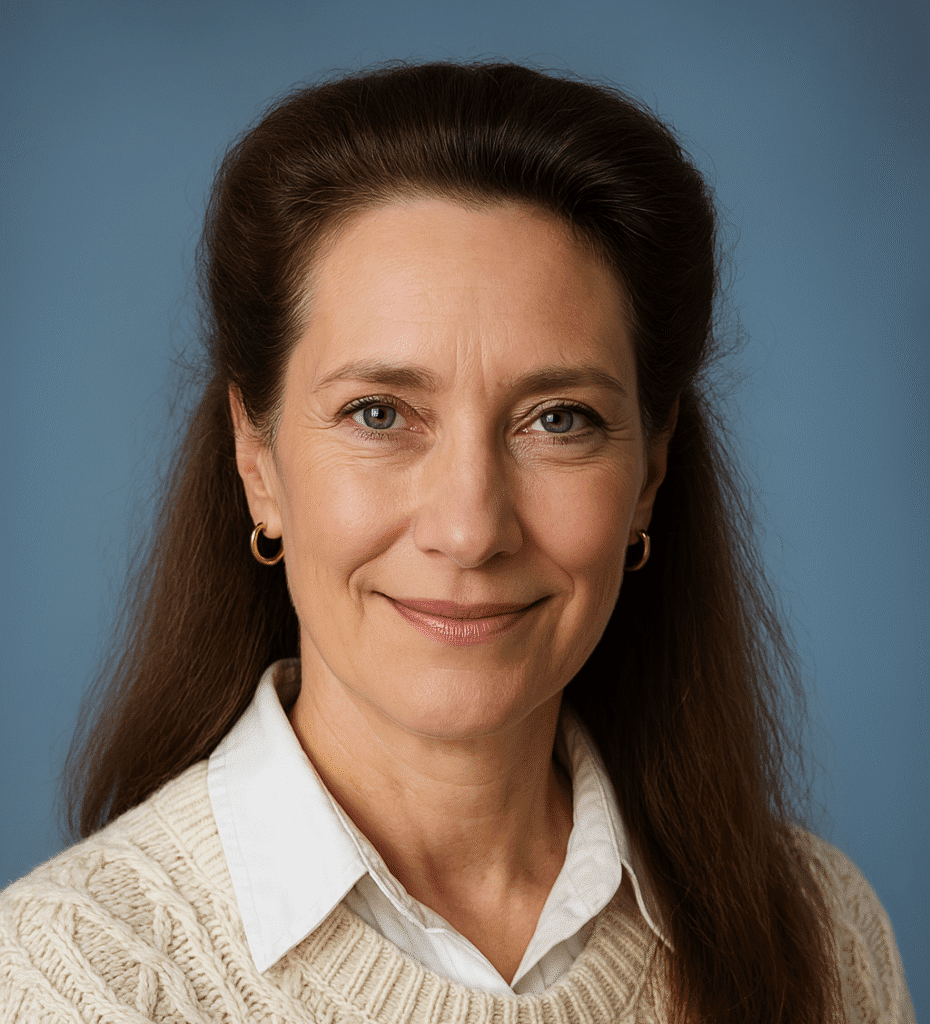
Author Bio: Dr Margaretha Montagu – described as a “game changer”, “gifted healer”, “guiding light” and “life-enriching author” – is an experienced medical doctor, a certified NLP practitioner, a medical hypnotherapist, an equine-assisted psychotherapist (EAGALAcertified) and a transformational retreat leader who guides her clients through life transitions – virtually, or with the assistance of her Friesian and Falabella horses, at their home in the southwest of France.

